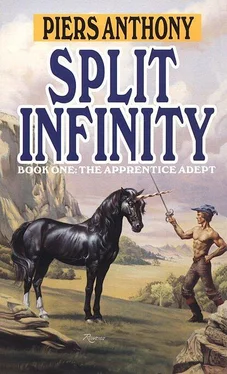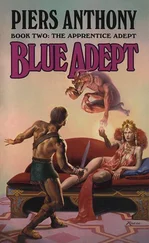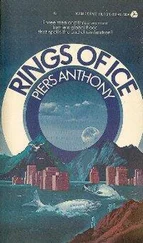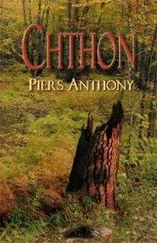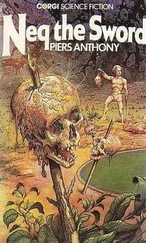Piers Anthony - Split Infinity
Здесь есть возможность читать онлайн «Piers Anthony - Split Infinity» весь текст электронной книги совершенно бесплатно (целиком полную версию без сокращений). В некоторых случаях можно слушать аудио, скачать через торрент в формате fb2 и присутствует краткое содержание. Год выпуска: 2011, Жанр: Фэнтези, на английском языке. Описание произведения, (предисловие) а так же отзывы посетителей доступны на портале библиотеки ЛибКат.
- Название:Split Infinity
- Автор:
- Жанр:
- Год:2011
- ISBN:нет данных
- Рейтинг книги:5 / 5. Голосов: 1
-
Избранное:Добавить в избранное
- Отзывы:
-
Ваша оценка:
- 100
- 1
- 2
- 3
- 4
- 5
Split Infinity: краткое содержание, описание и аннотация
Предлагаем к чтению аннотацию, описание, краткое содержание или предисловие (зависит от того, что написал сам автор книги «Split Infinity»). Если вы не нашли необходимую информацию о книге — напишите в комментариях, мы постараемся отыскать её.
Split Infinity — читать онлайн бесплатно полную книгу (весь текст) целиком
Ниже представлен текст книги, разбитый по страницам. Система сохранения места последней прочитанной страницы, позволяет с удобством читать онлайн бесплатно книгу «Split Infinity», без необходимости каждый раз заново искать на чём Вы остановились. Поставьте закладку, и сможете в любой момент перейти на страницу, на которой закончили чтение.
Интервал:
Закладка:
He followed the stream down, knowing it was a sure guide to the kind of animal life he wanted. This was ideal horse country; had he actually seen some horses grazing, there from the treetop, or only made an image of a wish? He could not be certain now, but trusted his instincts. Magic confused him, but he knew the ways of horses well.
Suddenly he spied it: the semicircular indentation of the hoof of a horse. And, safely back from the water, a pile of horse manure. Confirmation!
Stile examined the hoofprint. It was large, indicating an animal of perhaps seventeen hands in height, solidly built. It was unshod, and chipped at the fringes, but not overgrown. A fat, healthy horse who traveled enough to keep the hooves worn, and was careless enough to chip them on stones. Not the ideal mount for him, but it would do. Stile felt the relief wash through his body, now that he had the proof; he had not imagined it, he had not deluded himself, there really were horses here. His experience with the demon amulet had shaken his certainties, but this restored them.
He moved over to the manure and stared down at it. And faded into a memory. Seventeen years ago, as a youth of eighteen, looking down at a similar pile of dung...
His parents’ tenure had ended, and they had had to vacate Planet Proton. Tenure was twenty years for serfs, with no exceptions—except possibly via the Game, a more or less futile lure held out to keep the peons hoping. He had been fortunate; he had been born early in their tenure, and so had eighteen free years. He had fitted in a full education and mastered Proton society before he had to make the choice: to stay with his folks, or to stay on Proton.
His parents, with twenty years cumulative pay awaiting them, would be moderately wealthy in the galaxy. They might not be able to swing passage all the way back to Earth, but there were other planets that were really quite decent. They would be able to afford many good things. On the other hand, if he remained on Pro-ton he would have to serve twenty years as a serf, naked, obedient to the whims of some Citizen employer, knowing that when that tenure ended he too would be exiled.
But—here on Proton was the Game.
He had been addicted to the Game early. In a culture of serfs, it was an invaluable release. The Game was violence, or intellect, or art, or chance, alone or with tools or machines or animals—but mainly it was challenge. It had its own hierarchy, independent of the out-side status of the players. Every age-ladder had its rungs, for all to see. The Game had its own magic. He was good at it from the outset; he had a natural aptitude. He was soon on his ladder, on any rung he chose. But he never chose too high a rung.
Family—or Game? It had been no contest. He had chosen Planet Proton. He had taken tenure the day his parents boarded the spaceship, and he had waited for a Citizen to employ him. To his surprise, one had picked him up the first day. He had been conducted to the Citizen’s plush estate—there were no unplush Citizens’ estates—and put in the pasture and given a wagon and a wide pitchfork.
His job was to spade horse manure. He had to take his fork and wheelbarrow and collect every pile of dung the Citizen’s fine horses were gracious enough to de-posit on the fine lawns. Homesick for his exiled family —it was not that he had loved them less, but that at his age he had loved the Game more—and unaccustomed to the discipline of working for a living, he found this a considerable letdown. Yet it did allow him time to be alone, and this was helpful.
He was not alone during off-hours. He slept in a loft-barracks with nine other pasture hands, and ate in a mess hall with thirty serfs. He had no privacy and no personal possessions; even his bedding was only on loan, a convenience to prevent his sweat from contaminating anyone else. In the rooming the light came on and they all rose, swiftly; at night the light went out. No one missed a bed check, ever. At home with his folks he had had no curfew; they went off to their employers by day, and as long as he kept up with his schooling his time was largely his own—which meant he would be playing the Game, and drilling himself in its various techniques. Here it was different, and he wondered whether he had after all made the right choice. Of course he had to grow up sometime; he just hadn’t expected to do it overnight.
The Citizen-employer was inordinately wealthy, as most Citizens were. He had several fine pastures, in scattered locations. It was necessary to travel through the city-domes from one property to another, and somehow the work was always piling up ahead of him.
Some of the pastures were cross-fenced, with neat white Earth-grown wooden boards and genuine pre-rusted nails. These barriers were of course protected by invisible microwires that delivered an uncomfortable electric shock to anyone who touched the surface. The horses were not smart, but they had good memories; they seldom brushed the fences. Stile, of course, had to learn the hard way; no one told him in advance. That was part of his initiation.
He learned. He found that the cross-fencing was to keep the horses in one pasture while allowing a new strain of grass to become established in another; if the horses had at it prematurely, they would destroy it by overgrazing before it had a chance. Pastures were rotated. When animals had to be separated, they were put in different pastures. There were many good reasons for cross-fencing, and the employer, despite his wealth, heeded those reasons.
Stile’s problem was that he had to cross some of those fences, to collect the manure from far pastures. He was small, too small simply to step over as a tall serf might. He was acrobatic, so could readily have hurdled the 1.5 meter fences, but this was not permitted, lest it give the horses notions. The horses did not know it was possible to jump fences outside of a formal race, so had never tried it. Also, his landing might scuff the turf, and that was another offense. Only horses had the right to scuff; they were valuable creatures, with commensurate privileges.
Thus he had to proceed laboriously around the fence, going to far-flung gates where, of course, he had to debate the right-of-way with horses who outmassed him by factors of ten to fifteen. This slowed his work, and he was already behind. Fortunately he was a good runner, and if he moved swiftly the horses often did not bother to keep up. They could outrun him if they had a mind to, anytime, but they never raced when they didn’t have to. It seemed to be a matter of principle. They did not feel the same rivalry with a man that they did with members of their own species.
Then he discovered the stile: a structure like a standing stepladder that enabled him to cross the fence and haul his wheelbarrow across without touching a board. The horses could not navigate such a thing, and did not try. It was, in its fashion, a bridge between worlds.
With it he could at last get around the pastures fast enough to catch up to his work.
Now that he was on tenure, he was expected to take an individual name. He had gone by his father’s serf-name, followed by a dependence-number. When the Proton serf registry asked him for his choice of an original and personal designation, his irrevocable and possibly only mark of distinction, he gave it: Stile.
“Style? As in elegance?” the serf-interviewer inquired, gazing down at him with amusement. “A grandiose appellation for a lad your size.”
Stile’s muscles tightened in abdomen, buttocks, and shoulders. This “lad” was eighteen, full-grown—but to strangers he looked twelve. The depilatories in Proton wash water kept the hair off his face and genitals, so that his sexual maturity was not obvious. A woman his size would not have had a problem; depilatories did not affect her most obvious sexual characteristics. He was fed up with the inevitable remarks; normal-heighted people always thought they were being so damned clever with their slighting allusions to his stature. But already he was learning to conceal his annoyance, not even pretending to take it as humor. “Stile, as in fence. S-T-I-L-E. I’m a pasture hand.”
Читать дальшеИнтервал:
Закладка:
Похожие книги на «Split Infinity»
Представляем Вашему вниманию похожие книги на «Split Infinity» списком для выбора. Мы отобрали схожую по названию и смыслу литературу в надежде предоставить читателям больше вариантов отыскать новые, интересные, ещё непрочитанные произведения.
Обсуждение, отзывы о книге «Split Infinity» и просто собственные мнения читателей. Оставьте ваши комментарии, напишите, что Вы думаете о произведении, его смысле или главных героях. Укажите что конкретно понравилось, а что нет, и почему Вы так считаете.
